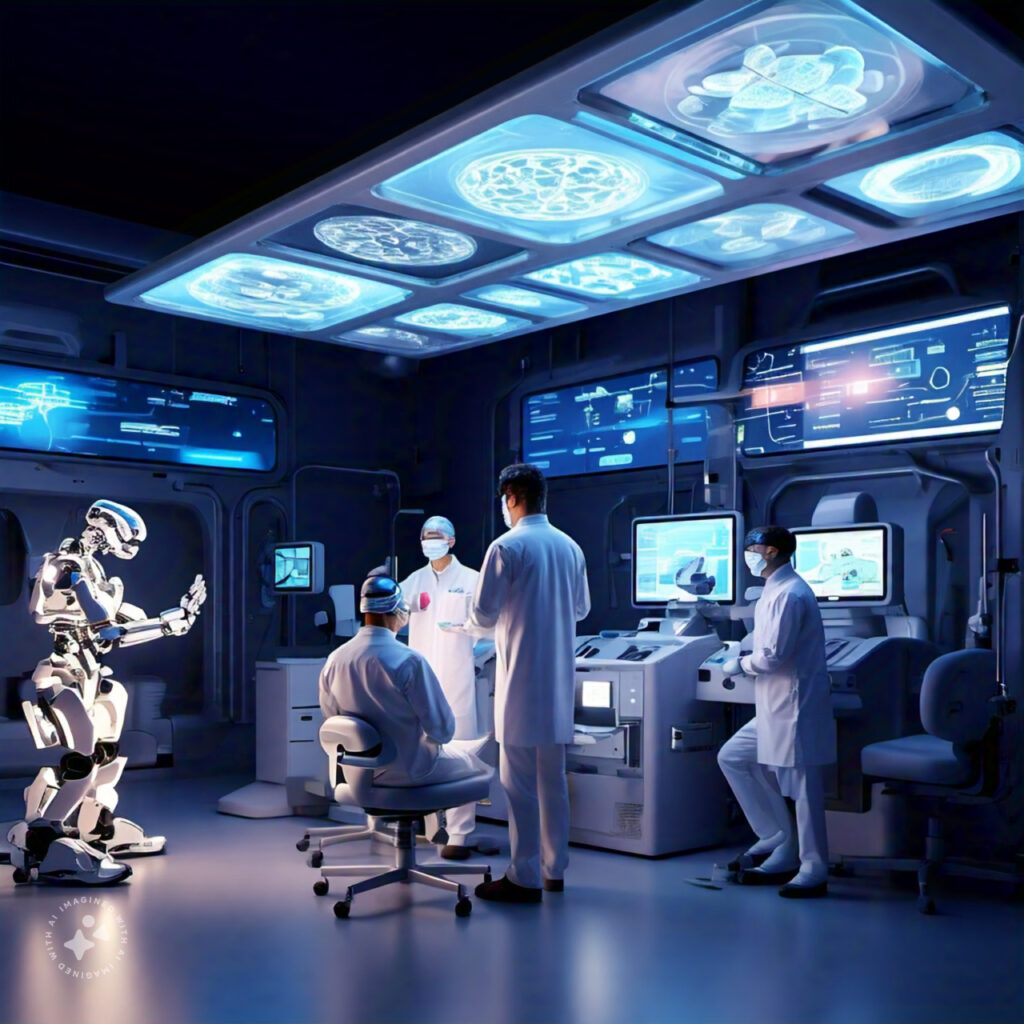
“The Role of Artificial Intelligence in Healthcare Innovation”
Artificial Intelligence (AI) is revolutionizing the healthcare industry by improving diagnostics, personalizing treatments, and streamlining administrative tasks. From predictive analytics to robotic surgeries, AI is enhancing patient care while reducing costs and errors. This article explores the transformative role of AI in healthcare, its applications, benefits, and the challenges it faces.
1. Introduction to AI in Healthcare
AI in healthcare leverages machine learning, natural language processing (NLP), and computer vision to analyze complex medical data. By mimicking human cognitive functions, AI systems assist healthcare professionals in decision-making, diagnosis, and patient management.
Key AI technologies in healthcare include:
- Machine Learning: For predictive analytics and personalized treatments.
- NLP: For processing clinical notes and patient records.
- Computer Vision: For analyzing medical images like X-rays and MRIs.
2. How AI is Transforming Healthcare
2.1 Improved Diagnostics
AI-powered tools analyze patient data and medical imaging to detect diseases like cancer, heart conditions, and neurological disorders with high accuracy.
2.2 Personalized Medicine
AI enables the customization of treatment plans based on individual genetic profiles, medical history, and lifestyle.
2.3 Predictive Analytics
By analyzing patterns in patient data, AI predicts potential health issues, enabling early intervention and preventive care.
2.4 Enhanced Surgical Precision
Robotic surgery systems, guided by AI, offer unparalleled precision, reducing recovery times and improving surgical outcomes.
2.5 Efficient Administrative Workflows
AI automates routine tasks like appointment scheduling, billing, and record-keeping, allowing healthcare providers to focus more on patient care.
3. Applications of AI in Healthcare
3.1 Disease Detection and Diagnosis
- AI algorithms analyze medical imaging to detect conditions like tumors, fractures, and infections.
- Virtual health assistants provide preliminary diagnoses based on symptoms.
3.2 Drug Discovery and Development
AI accelerates drug discovery by analyzing molecular structures and predicting their efficacy, reducing time and costs.
3.3 Remote Patient Monitoring
Wearable devices powered by AI monitor vital signs in real-time, alerting doctors to any abnormalities.
3.4 Mental Health Support
AI-driven chatbots and apps provide mental health support by detecting emotional states and recommending interventions.
3.5 Healthcare Robotics
Robots assist in surgeries, rehabilitation, and patient care, enhancing precision and efficiency.
4. Benefits of AI in Healthcare
- Increased Accuracy: Reduces diagnostic errors and improves treatment outcomes.
- Cost Savings: Streamlines operations, reducing unnecessary tests and hospital visits.
- Accessibility: Brings healthcare services to remote and underserved areas.
- Enhanced Patient Experience: Provides faster, more efficient, and personalized care.
5. Challenges in Implementing AI in Healthcare
5.1 Data Privacy and Security
AI systems rely on large volumes of sensitive patient data, raising concerns about privacy and cybersecurity.
5.2 Integration with Existing Systems
Incorporating AI into legacy healthcare systems can be complex and costly.
5.3 Ethical and Regulatory Issues
Questions about AI’s decision-making transparency and accountability need to be addressed.
5.4 Bias in AI Models
AI models may perpetuate biases present in training data, leading to disparities in healthcare outcomes.
5.5 High Initial Costs
The development and deployment of AI technologies require significant investment.
6. Future Trends in AI and Healthcare
6.1 AI-Driven Telemedicine
AI will enhance telemedicine by providing real-time diagnostics and virtual consultations.
6.2 Genomic Medicine
AI will play a pivotal role in analyzing genomic data to provide insights into hereditary diseases and tailor treatments.
6.3 Real-Time Decision Support
AI will assist doctors by providing real-time insights during surgeries and other medical procedures.
6.4 Global Health Monitoring
AI will help monitor and predict global health trends, enabling faster responses to pandemics and outbreaks.
6.5 Advanced Robotics
Future AI-driven robots will not only assist in surgeries but also perform them autonomously in controlled environments.
7. Real-World Examples of AI in Healthcare
- IBM Watson Health: Assists in cancer research and diagnosis by analyzing vast amounts of medical literature and patient data.
- Google DeepMind Health: Helps predict patient deterioration in hospitals through real-time data analysis.
- Butterfly Network: Uses AI-powered handheld ultrasound devices for affordable diagnostics.
- Aidoc: An AI tool that analyzes radiology scans to identify critical conditions in emergency rooms.
- PathAI: Improves pathology by using AI to analyze tissue samples for disease detection.
8. Conclusion
Artificial Intelligence is transforming healthcare into a more efficient, personalized, and accessible industry. While challenges such as data privacy, bias, and high costs remain, the potential benefits of AI far outweigh the drawbacks. As technology advances, AI will continue to redefine how healthcare is delivered, saving lives and improving global health outcomes.
Let me know if you’d like this article modified or converted into an HTML format!